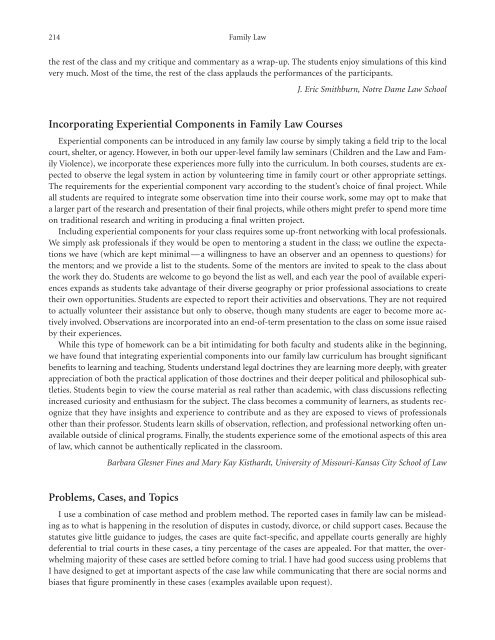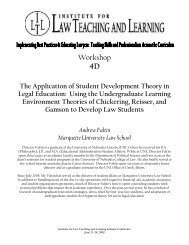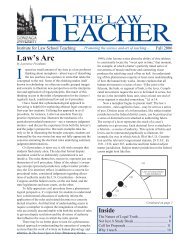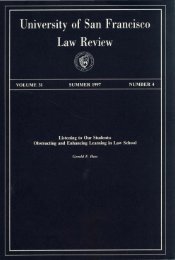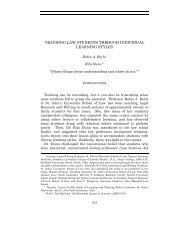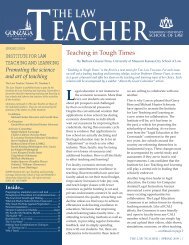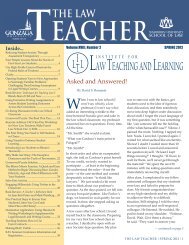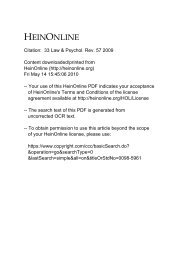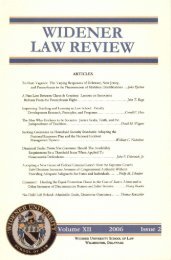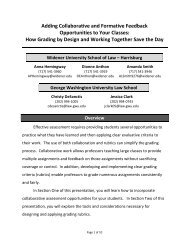Teaching the Law School Curriculum - Institute for Law Teaching ...
Teaching the Law School Curriculum - Institute for Law Teaching ...
Teaching the Law School Curriculum - Institute for Law Teaching ...
You also want an ePaper? Increase the reach of your titles
YUMPU automatically turns print PDFs into web optimized ePapers that Google loves.
214 Family <strong>Law</strong><br />
<strong>the</strong> rest of <strong>the</strong> class and my critique and commentary as a wrap-up. The students enjoy simulations of this kind<br />
very much. Most of <strong>the</strong> time, <strong>the</strong> rest of <strong>the</strong> class applauds <strong>the</strong> per<strong>for</strong>mances of <strong>the</strong> participants.<br />
Incorporating Experiential Components in Family <strong>Law</strong> Courses<br />
J. Eric Smithburn, Notre Dame <strong>Law</strong> <strong>School</strong><br />
Experiential components can be introduced in any family law course by simply taking a field trip to <strong>the</strong> local<br />
court, shelter, or agency. However, in both our upper-level family law seminars (Children and <strong>the</strong> <strong>Law</strong> and Family<br />
Violence), we incorporate <strong>the</strong>se experiences more fully into <strong>the</strong> curriculum. In both courses, students are expected<br />
to observe <strong>the</strong> legal system in action by volunteering time in family court or o<strong>the</strong>r appropriate settings.<br />
The requirements <strong>for</strong> <strong>the</strong> experiential component vary according to <strong>the</strong> student’s choice of final project. While<br />
all students are required to integrate some observation time into <strong>the</strong>ir course work, some may opt to make that<br />
a larger part of <strong>the</strong> research and presentation of <strong>the</strong>ir final projects, while o<strong>the</strong>rs might prefer to spend more time<br />
on traditional research and writing in producing a final written project.<br />
Including experiential components <strong>for</strong> your class requires some up-front networking with local professionals.<br />
We simply ask professionals if <strong>the</strong>y would be open to mentoring a student in <strong>the</strong> class; we outline <strong>the</strong> expectations<br />
we have (which are kept minimal — a willingness to have an observer and an openness to questions) <strong>for</strong><br />
<strong>the</strong> mentors; and we provide a list to <strong>the</strong> students. Some of <strong>the</strong> mentors are invited to speak to <strong>the</strong> class about<br />
<strong>the</strong> work <strong>the</strong>y do. Students are welcome to go beyond <strong>the</strong> list as well, and each year <strong>the</strong> pool of available experiences<br />
expands as students take advantage of <strong>the</strong>ir diverse geography or prior professional associations to create<br />
<strong>the</strong>ir own opportunities. Students are expected to report <strong>the</strong>ir activities and observations. They are not required<br />
to actually volunteer <strong>the</strong>ir assistance but only to observe, though many students are eager to become more actively<br />
involved. Observations are incorporated into an end-of-term presentation to <strong>the</strong> class on some issue raised<br />
by <strong>the</strong>ir experiences.<br />
While this type of homework can be a bit intimidating <strong>for</strong> both faculty and students alike in <strong>the</strong> beginning,<br />
we have found that integrating experiential components into our family law curriculum has brought significant<br />
benefits to learning and teaching. Students understand legal doctrines <strong>the</strong>y are learning more deeply, with greater<br />
appreciation of both <strong>the</strong> practical application of those doctrines and <strong>the</strong>ir deeper political and philosophical subtleties.<br />
Students begin to view <strong>the</strong> course material as real ra<strong>the</strong>r than academic, with class discussions reflecting<br />
increased curiosity and enthusiasm <strong>for</strong> <strong>the</strong> subject. The class becomes a community of learners, as students recognize<br />
that <strong>the</strong>y have insights and experience to contribute and as <strong>the</strong>y are exposed to views of professionals<br />
o<strong>the</strong>r than <strong>the</strong>ir professor. Students learn skills of observation, reflection, and professional networking often unavailable<br />
outside of clinical programs. Finally, <strong>the</strong> students experience some of <strong>the</strong> emotional aspects of this area<br />
of law, which cannot be au<strong>the</strong>ntically replicated in <strong>the</strong> classroom.<br />
Barbara Glesner Fines and Mary Kay Kisthardt, University of Missouri-Kansas City <strong>School</strong> of <strong>Law</strong><br />
Problems, Cases, and Topics<br />
I use a combination of case method and problem method. The reported cases in family law can be misleading<br />
as to what is happening in <strong>the</strong> resolution of disputes in custody, divorce, or child support cases. Because <strong>the</strong><br />
statutes give little guidance to judges, <strong>the</strong> cases are quite fact-specific, and appellate courts generally are highly<br />
deferential to trial courts in <strong>the</strong>se cases, a tiny percentage of <strong>the</strong> cases are appealed. For that matter, <strong>the</strong> overwhelming<br />
majority of <strong>the</strong>se cases are settled be<strong>for</strong>e coming to trial. I have had good success using problems that<br />
I have designed to get at important aspects of <strong>the</strong> case law while communicating that <strong>the</strong>re are social norms and<br />
biases that figure prominently in <strong>the</strong>se cases (examples available upon request).


